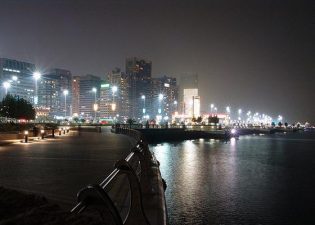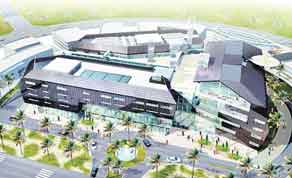 The CEO of a Dubai-based company says growing organic food in the UAE is “stupid.”
The CEO of a Dubai-based company says growing organic food in the UAE is “stupid.”
No one would ever expect an organic food distributor to favor importing food to locally-grown produce, except in the Middle East. Despite efforts from people like Baker & Spice’s Yael Mejia, who is working furiously to improve the quality of local food, most of the United Arab Emirates receive their nutrition in large crates from afar. And we thought this was a bad thing.
Not so, according to the head of a leading organic food store in Dubai. Nils El Accad told Arabian Business that it makes more sense for the UAE to freight its food in from other countries than to grow it locally. His ideas may seem completely anti-green coming from an organic food distributor, but his logic is fairly sound. Well – almost.
CEO of Dubai-based Organic Foods and Cafe, Mr. Accad told the paper that since most UAE farmers use desalinated water to irrigate their crops, which requires a massive energy outlay and is ruinous to marine environments as a result of excess salt brine being pumped into the Gulf, locally-grown food has a higher carbon footprint than food produced in other countries.
He adds that other farmers who use scarce groundwater for agricultural projects put the Emirates’ long-term food security at tremendous risk, since over-extraction has rendered the finite resource increasingly saline. He worries that a day will come when dire food shortages will not be easily rectified, since the remaining freshwater will have been wasted.
But how does Mr. Accad propose to solve this problem? According to him, food brought in from Egypt has a negative carbon footprint since his producer uses compost, which rejuvenates the soil and uses no fertilizers or pesticides. The carbon footprint required to ship the produce from Egypt to the United Arab Emirates, he claims, is less than that generated locally.
Furthermore, instead of looking to Africa’s breadbasket like many of the Gulf countries, Mr. Accad encourages importers to look to Pakistan for organic produce. He told the paper that not only does the country have plenty of water and good soil, they have a labor force that could easily be trained to produce organic food. For the United Arab Emirates.
That would be OK, except as one Arabian Business reader pointed out, Pakistan is embroiled in a political conflict that does not seem to be on the wane, and Pakistan might also want to keep some of its produce for itself.
Some of the solutions not proposed by Mr. Accad for a deeply troubling reality for residents of the dry desert of the UAE, include recycling grey and black water, enforcing stricter conservation rules, and harvesting what little rain does fall.
And then, while at it, perhaps scale back on some of those obscene building projects?
More on organic agriculture in the Middle East:
Organic Farms Growing in Dubai
Egypt’s Organics Industry to Get First World Regulations
Lebanon Celebrates Three Years of an Organic Farming Project




Dear Sir / Madam,
I would like to introduce our company Sree Rayalaseema Alkalies and Allied Chemicals Limited to you and give a brief outline of our Products that we offer which may be of interest to your trade in your esteemed country. Our company is one of the major conglomerate of our USD200million based TGV Group and is ISO 9002 & ISO 14001 Certified with our major manufacturing interests in Castor Oil Derivatives, Chloro Alkali Products, Water Treatment Chemicals, etc., and we have won several prestigious National Awards from Government of India like the highest National Award for R & D, Safety Standards and for Maintenance of Environment.
Our Multi Products range includes:
1.HYDROGENATED CASTOR OIL –HCO (Flakes / Powder)
2.12 HYDROXY STEARIC ACID -12HSA((Flakes / Powder)
(Our plant capacity for HCO 80 tons and 12 HSA 80 tons per day capacity)
3) Methyl 12-Hydroxy Stearate
4). Refined Castor Oil (BSS Grade)
5)RICINOLEIC ACID(Liquid)
6)CAUSTIC POTASH FLAKES -90% (POTASSIUM HYDROXIDE FALKES)
(Our plant capacity for KOH FLAKES 90% 120 tons per day capacity)
7) Soap Noodles
8) Glycerin
Our products being of World Class quality and produced as per International Standards.
We now request you to get back to us with information on interested parties dealing with us on our range of products and as to your interest in marketing our products in your areas of operation.
Looking forward to receive your positive response.
With regards,
Krishna Mohan N.V.
Senior General Manager
Organic farming is not just growing without herbicides pesticides and chemical fertilizers, and just applying compost to the soil. This alone will not necessarily give more nutrient foods. The soil must be given the correct amount of organic nutrients for the bacteria to be able to make them available to the plants.Today the food that is eaten (non-organic) has 5 times less nutrients than food eaten in the 1940’s! I have farmed professionally in several different climates, including Al Ain,and am sure that organic farming could be very successful in the Emirates if the end product was a nutrient dense food.Naturally water is a problem, but a lot of the problems could be overcome if modern methods are used and bio-char (charcoal) made from organic waste, including garbage, was used in the soil. this would act as a purifier and filter(for grey water) and also helps to retain water in the soil. I think that small local farms will benefit the Emirates much more than huge international companies. I have seen that a new organic farm of about 100 acres in Dubai is looking for a manager. Pity I am approaching 70 as I would love to get away from our cold winters here in BC. Done carefully organic farming is essential and could over time create micro-climates that would bring more rainfall.
Regards,
Ken Bourne
BC Canada
Nils, I have really pondered on this issue several times. I agree with your views totally. I bought some bio eggs recently in a local bio shop that sells veggies from his bio farm here in the UAE. I just hope that they are using the right kind of healthy futter for the chickens… you are aware about the dioxin issue in Germany, where the Food Control Organisation closed down several chicken farm owners.
Thanks Sally. We ran an interview with Yael Mejia from Dubai & Spice who basically said the same thing. Not just taste is at stake, but health, right?
Mr Accad does not mention taste and nutrition in his argument. When Nazwa organic farm was operating the taste of the fresh vegetables and herbs delivered daily had people queuing up. This taste difference is not apparent in the majority of the freighted in products in his shops (which sits around for a long time leading to the disappation of vitamins).
Apparently the UAE uses more water per capita than most of the rest of the world. Even if it didn’t, desalination is still a nontrivial environmental concern. As for local organic farming, saline-tolerant plants may be an option worth considering, as such would allow farmers to use more water since it would presumably be less desalinated than otherwise:
http://www.ehow.com/list_6455607_plants-grow-saline-water.html
Vertical farming might be the answer to the food problem in this region.